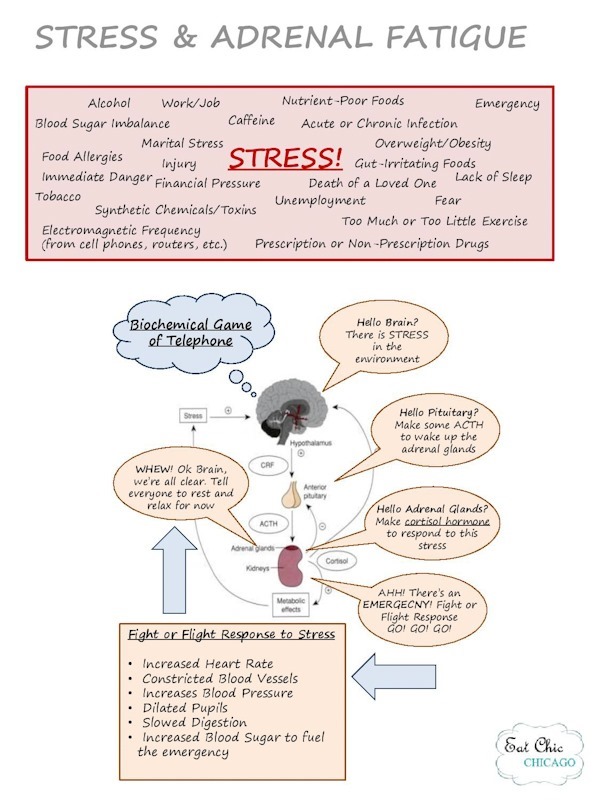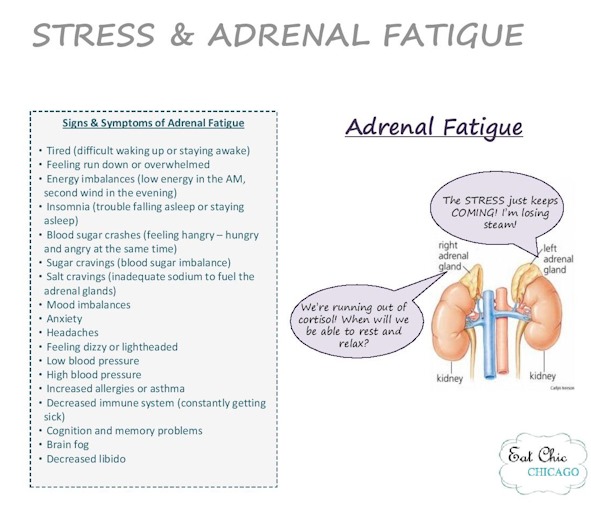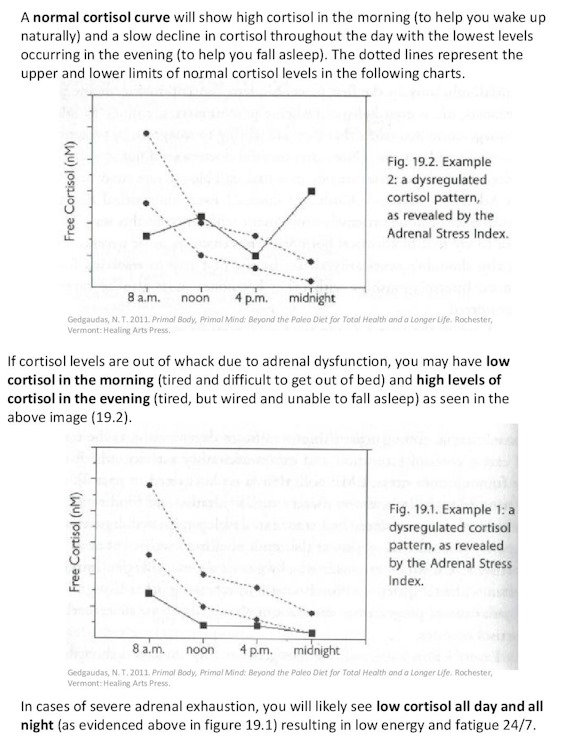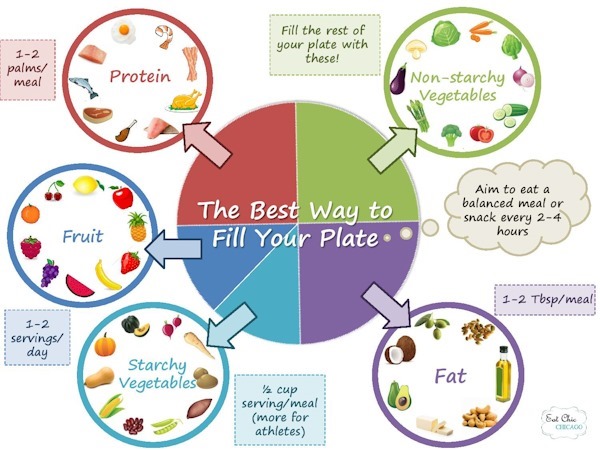Today’s guest post comes from Amari Thomsen, MS, RD, LDN, who writes the blog Eat Chic Chicago! Amari owns a nutrition practice and works with clients suffering from adrenal fatigue. Her post today will illustrate the consequences of chronic stress in the body and how proper nutrition can pave the way to a healthier lifestyle. Enjoy!
The relationship between stress, obesity and metabolic disease is an important one to understand. Stress is something everyone experiences. Stress helps motivate us. We stress about our job, our finances, our family, our environment – the list is endless. But can all of that stress be detrimental to our health? Could stress be linked to obesity and weight loss resistance?
Understanding Stress Response
The body reacts to all forms of stress (whether you are physically running from immediate danger or you are mentally stressed at work) in the same manner using a pathway called the HPA Axis (an axis between the Hypothalamus (in the brain), the Pituitary gland and the Adrenal glands). No need to memorize all the big words, just think of it as a biochemical game of telephone. Your brain perceives stress from the environment, and a chain reaction begins inside the body ultimately signaling your adrenal glands. Your adrenal gland are tiny little glands that sit on top of your kidneys. They are responsible for producing a hormone called cortisol – our stress hormone.
Under periods of stress, cortisol sends the body into a “fight or flight” response to help the body manage the environmental stress. Imagine how your body would respond to escape a burning building. Your blood pressure goes up (you want more blood to your muscles to get you moving!), your blood sugar increases (your body begins mobilizing sugar to feed your muscles), your heart rate increases, your pupils dilate to see better, and processes that are less important during a state of emergency (like digestion and elimination) slow down. Soon you are out of danger, away from the burning building, and your body begins to relax again.
This is how our body survives. Without this emergency stress response, acute stress would be the end of us. Remember, your body elicits the same stress response regardless if the stress is physical or mental. So what happens when the stress is more constant? What if you are stressed about getting up for work every single day? This consistent, more chronic, form of stress is where things can become problematic. If you are stressed day in and day out from work, family, money, you name it, your adrenal glands start to wear out – they become fatigued. They weren’t designed for this kind of chronic stress, all the time, every single day, 24/7.
What is Adrenal Fatigue?
Adrenal fatigue occurs when your adrenal glands become overworked by constant chronic stress resulting in an inability to produce enough cortisol to cope with it all. Basically too much stress for way too long. Our bodies are adapted to respond to short bouts of stress followed by periods of rest and relaxation (remember the burning building?). However, when period of acute stress becomes chronic, the body begins to have difficultly continuously responding to this stress. The negative feedback that tells the brain to turn off the adrenal glands cortisol production (when stress is gone and we can rest) is broken because the stress never fully goes away. Enter adrenal fatigue.
What are the Signs and Symptoms of Adrenal Fatigue?
The different stages of adrenal fatigue ranging from sub-optimal function to complete exhaustion can manifest as varying signs and symptoms. While your cortisol levels will initially be high under lots of stress, as your adrenal glands become more and more fatigued, cortisol levels begin to dwindle because you run out of steam. Symptoms may include feeling tired, run down, and overwhelmed. You may have trouble falling asleep, staying asleep, or waking up in the morning (this is because cortisol hormone is also involved in your sleep cycles). You might experience sugar cravings (as the body continues to try and mobilize sugar in response to stress) or salt (the adrenal glands require sodium to function optimally). You might find yourself having headaches, anxiety, or mood swings. Chronic stress can also suppress the immune system so newly developed food intolerances, allergies, or infections might begin to pop up.
How can Adrenal Fatigue Lead to Weight Gain?
Cortisol increases caloric intake of high energy dense foods (such as high fat, high sugar foods) that will immediately support the body’s need for energy and increased blood sugar to survive environmental stress. Eating is a biochemical response to stress. However, with increased caloric intake of sugary fatty junk food, our body begins laying down fat stores, primarily in our midsection. What’s the reason behind this centralized adiposity? According to author of Fat Chance, Dr. Robert Lustig, “belly fat breaks down into fatty acids faster, and has a direct line to the liver for burning”. Basically our body can get to the fat faster when we need it in times of physical emergency. Any dietitians out there recall that excessive abdominal fat is part of metabolic syndrome? Increased central obesity is a direct risk factor for heart disease, stroke, atherosclerosis, and kidney disease. Not to mention that chronically elevated cortisol can also affect your thyroid gland function as well…but that’s a story for another day.
Are there Tests that Prove Adrenal Fatigue?
Yes. Adrenal fatigue/cortisol tests come in the form of a salivary test. You spit into tubes throughout the course of the day (typically 8AM, Noon, 4PM and midnight) and the lab measures the cortisol levels in each tube. Saliva tests can be ordered and administered by medical professionals.
How can Nutrition Help?
Different nutrition protocols are recommended based on the stage of adrenal dysfunction you are experiencing and results from a saliva lab test. It’s important to always consult a medical professional before making any changes to your diet, lifestyle, or supplement regimen. That being said, a diet low in inflammatory foods (those that cause stress to the gut) is a good place to start. This is where a diet low in sugar and refined carbohydrate and high in quality anti-inflammatory fats and proteins (i.e. a Paleo diet for example) makes biochemical sense. Additionally, a diet that allows for your body to maintain balanced blood sugar throughout the day (a healthy balanced plate of smart carbohydrates, quality protein, and healthy fats at every meal and snacks every 2-3 hours) is key.
Additional supplementation depends on the individual. High quality mineral salt may be beneficial for individuals experiencing adrenal exhaustion. In Good Calories, Bad Calories, Gary Taubes makes a unique reference:
“…rats whose adrenal glands are removed cannot retain salt, and will die within two weeks on their usual diet, from the consequences of salt depletion. If given a supply of salt in their cages, however or given the choice of drinking salt water or pure water, they will choose either to eat or to drink the salt and, by doing so, keep themselves alive indefinitely. These rats will develop a “taste” for salt that did not exist prior to the removal of their adrenal glands. The question most relevant to weight regulation concerns the quantity of food consumed. Is it determined by some minimal caloric requirement, by how the food tastes, or by some other physical factor – like stomach capacity, as is still commonly believed?”
Other vitamins that might suffer from depletion in the presence of adrenal fatigue include vitamin C, B vitamins and magnesium. The adrenal glands contain high concentrations of vitamin C, and B vitamins (primarily pantothenic acid (vitamin B5)) are important in the production of cortisol and the structural integrity of adrenal glands. Magnesium can help the body relax and reduce anxiety and stress.
The bottom line is that it is important to support your adrenal glands with a nutritious diet and healthy lifestyle that incorporates stress management. Otherwise it become a vicious cycle as stress breeds more cortisol, and cortisol breeds more stress with abdominal adiposity (weight gain), insulin resistance and increased risk of cardiovascular disease developing along the way. Dr. Robert Lustig said it best, “stressed is desserts spelled backward…the behaviors of gluttony and sloth are very real, but they are results of changes in the brain biochemistry.”
For more information or questions regarding adrenal fatigue or assistance in developing a nutrition and supplement plan for optimal adrenal function, please contact Amari of Eat Chic Chicago.
Sources
Gedgaudas, N. T. 2011. Primal Body, Primal Mind: Beyond the Paleo Diet for Total Health and a Longer Life. Rochester, Vermont: Healing Arts Press.
Taubes, G. 2008. Good Calories, Bad Calories: Fats, Carbs, and the Controversial Science of Diet and Health. New York: Random House, Inc.
Lustig, R. H. 2013. Fat Chance: Beating the Odds Against Sugar, Processed Food, Obesity, and Disease. New York: Penguin Group.
Hartwig, D. 2012. It Starts with Food: Discover the Whole30 and Change your Life in Unexpected Ways. Auberry, California:Victory Belt Publishing Inc.
Amari Thomsen is a Chicago Registered Dietitian and owner of nutrition consulting private practice, Eat Chic Chicago. Through Eat Chic Chicago, Amari is focused on integrating modern and traditional techniques to promote real food nutrition and aims to bring the most up-to-date health information and nutrient-packed superfood recipes to her clients and readers through her blog. She offers individual nutrition coaching for weight loss and specialty diet management, personalized grocery store tours, group seminars and healthy cooking demonstrations. Amari is also a freelance writer and nutrition blogger for local organizations and brands that support healthy living. She has previous experience working with Whole Foods Market, Naked Juice, KIND, and Lifetime Fitness. Read her nutrition blog and find her on Twitter, Facebook and Pinterest!







Katie @ Talk Less, Say More says
Hitting a little close to home on a few of those symptoms… 😉
Ali says
Thanks for shedding light on this. In my acupuncture practice, I see so many people that suffer from adrenal fatigue! It’s a big issue right now and between healthy food choices and some herbs and acupuncture, people really can get going in the right direction!
Alex @ Kenzie Life says
I think adrenal fatigue is something I desperately need to be tested for. Thank you for sharing this, Amari!
Hannah @ eat, drink, and save money says
Thanks for this! I love educational posts, I feel like I learned a lot from reading this. I am going to use this an excuse to do more yoga.
Andrea says
Those symptoms basically describe every 20-30 something person I know…it’s important to remember that more than just “adrenal fatigue” can cause the symptoms listed, and that the vast majority of fatigue is caused by non-medical issues (poor sleep hygiene, not getting enough sleep, etc.)
TheHealthyApple says
I had adrenal failure for years; such a tough thing to heal and it was rough but love this post Kath. Miss you and hope you are well! oxxxx
Candice says
Loooove this!!! I was just diagnosed with stage IV endometriosis, and thinking about getting my adrenals tested. I already follow a low inflammation paleo diet but thinking I need something else. What is your lab of choice? I’m a registered dietitian, and can order my own tests. I was looking into BioHealth Labs and Diagnose Techs. Thanks!
Korkys says
Adrenal fatigue is so common right now and all it boils down to is your diet. I had all these symptoms and more – waking so many times at night, no energy all day, craving sugar, hairloss even though I tried my best at eating healthy. Turns out, my diet was so unbalanced. I would try so hard during the week and at weekends it went out the window. My head was bursting with all the info out there on what to eat, what not to eat.I discovered Gokaleo’s blog and have never felt better in my life. All you have to do is EAT! If you want a cookie, eat the cookie. If you want ice-cream, eat the ice- cream.There is no bad/good foods and if you allow yourself the food you want, you will NEVER feel deprived and feel the need to binge. The vilification of food needs to STOP as women (and Men) are ruining their health unnecessarily.
Nicole Bowles says
While I do find this a fascinating topic-I studied cortisol mediated metabolic syndrome for my PhD thesis, I think it’s important to point out that for many, adrenal fatigue like depression does occur at least at some point in a large portion of the population. HOWEVER, for most it is a temporary occurrence. Our bodies are made up of amazing systems that mount responses that allow us to adapt to our lived environment. I also think the sweet/fat intake driven by increased cortisol levels is independent of adrenal fatigue where levels are lower. Scientifically I don’t think we still understand why a portion of the population is likely to gain weight with low levels of cortisol.
Elyse says
Thank you so much for this! I suppose I really should be signing up for that yoga class, I keep meaning to sign up for!
Leatitia says
Very interesting!
Nicole says
This was a great post, thanks for sharing. I learned the importance of “healing my hormones” (including adrenal glands) through nutrition after a really difficult pregnancy and unexpected outcomes once my baby got here. Being a registered nurse, I feel like hormone health can easily be overlooked or dismissed, and I think it’s important for people to understand why eating healthy does more than trim down their waistline :).
sarah (the SHU box) says
ahh, i think my last comment got eaten! basically wanted to say that i think “adrenal fatigue” is more a normal adrenal response to a problem lifestyle, NOT a problem with the adrenals themselves. i think it’s an important distinction not to ‘medicalize’ the effects of a stressful lifestyle with poor sleep, bad diet, no rest, etc 🙂 an interesting post though not without some controversy of course!
Andrea says
I totally agree Sarah!
Candice Dreyer says
I have to disagree Sarah. I walk daily plus pilates 3x/week, get 8 hours sleep night, get plenty of rest and have a super healthy diet and still have most of those symtoms. I was just diagnosed with endometriosis after 13 years of pain and infertility, which I think contributes to/causes adrenal fatigue, so I don’t think it’s just a problem from a bad lifestyle. However, when you listen to the adrenal experts speak, they do say you have to treat both the adrenals and the lifestyle, so I agree with that.
Kat says
Adrenal fatigue, even if you are not overweight, has a negative effect on fertility hormones as well. I’m seeing a nutritionist (for fertility reasons) with a similar approach. One interesting thing that my nutritionist believes is that running for exercise is bad (I don’t buy it completely, I still run a little). But basically, she believes that your body gets into flight mode when you run, and it can cause cortisol spikes.
Eliminating grains and most carbs is definitely an area for debate, but I will say that eating this way, I feel a lot less hungry throughout the day and generally feel less stressed. Yet to be seen what it does for fertility, but fingers crossed it helps there too.
Natalie says
My favorite guest nutrition post yet. Diet (yay paleo!) AND lifestyle changes made a big difference for my adrenal fatigue. Start in the hypothalamus!
Amari @ Eat Chic Chicago says
Thanks Natalie for the support! Glad to hear you’ve seen success with change in diet and lifestyle to support healthy adrenals!
Anita says
Adrenal fatigue shares a number of symptoms with Anorexia/Starvation. Before one self diagnoses and further limits their diet I would recommend taking a hard look at their food intake to make sure they are eating ENOUGH calories. Here is a nice summary https://gokaleo.com/2013/01/25/adrenal-fatigue-as-a-cover-for-starvation/
Lynda says
Anita, very interesting and informative summary. I have experienced so much of what you wrote about. Since going through an ED in my late 20’s I still struggle with many of the same issues. Women especially are conditioned to think eating less is something to feel good about all the while we are probably starving our bodies and wonder why we feel fatigued, depressed, can’t sleep, etc. Thank you for the insight!
Kelly says
Definitely my favorite guest RD post yet!! (Actually, I hate to admit… but it’s the first one I’ve read all the way through!). Very well written, clear, nice visual support, and timely for me!
Amari @ Eat Chic Chicago says
Thanks Kelly! You know how to make a girl feel loved! Glad you enjoyed reading!
Ella says
Very interesting – I feel like I should get some CEU credits for reading this (fellow RD here 🙂
KathEats says
Haha that would be sweet!
Marie @ My Personal Finance Journey says
Thank you so much for this one, I just realized I think I have an adrenal fatigue. I really have a hard time sleeping, I only can sleep about 4 hours, I’m always hungry, headache, sugar cravings PLUS I have a low blood pressure. I tried to jog thrice a week but I’m still gaining more weight weekly!
Kelly says
This is SO interesting Amari. Kath, I would be curious to hear your thoughts on the idea that running is not a good form of exercise because it spikes up your cortisol. I am a yoga teacher and while of course yoga is my passion, when I want a hard workout, I find that running really is the only thing that feeds that. I know you are a runner and do some yoga and strength training too so it would be great to hear your perspective on how “hard” we really need to be working out. Maybe moderation is the key?
KathEats says
I think moderation is definitely the key. I don’t want to offend any marathoners or distance runners because there are those who are built for distance running and thrive on it and probably have no negative side effects, but I think when you move into that amount of running, some people’s bodies probably do go into stress mode. (I think mine would. And I’m talking multiple marathons in a row). I think the benefits of going for a few miles a few times a week absolutely cancels out any stressful side effects.
oldmotherrunner says
As another RD I agree that this is an interesting post but want to emphasize to the non professional reader that these symptoms can be linked to a variety of medical issues ( as noted above) and that a supported diagnosis is warranted. The basic diet recommendations are certainly useful for EVERYONE although I will never give up a crusty loaf of real bread on occasion ! 🙂
Danielle says
This is such a good, in-depth post about adrenal fatigue. I had never heard of it until attending a holistic health program, and I think it affects so many people without them realizing quite what it is.
Ashley R says
Hey Kath,
I really enjoyed reading this guest blog post and think it can be very useful to a lot of people! I noticed that Amari is more “Paleo-oriented” and I am wondering how you believe grains and diary fit into overcoming symptoms of adrenal fatigue through diet.
Thanks!
KathEats says
I am not an expert on this particular disorder, but you know what my nutrition beliefs are: real food, mostly plants (including grains), with meats and dairy sprinkled in. So my opinion is that the low-processed foods and low-sugar/alcohol/refined carbs principles of the Paleo diet are what would be most important. I don’t think eating whole milk yogurt or whole grain bread is going to prevent anyone from overcoming adrenal fatigue. I’d be interested in there was research behind even lower carbs than would be recommended for a healthy person though.
Giselle says
One thing I don’t like is that many of the so called “stressors” labeled with adrenal fatigue can actually Be stress relieving to many. (Especially if the fatigue is due to emotional reasons which many are) the last thing one needs who’s emotionally stressed is an overly strict diet with too many rules and restrictions)
And a big one is slowing down and actually taking the time to eat, and truly enjoying your food, or taking the time to be present in nature without your phone on. Even if it’s just 15 minutes. Things like that can be more important and restorative than diet and supplements.
Plus when you see all these charts about stress it makes one afraid to live — again that defeats the purpose.
Anyhow, some experts like Dr Lam even say to avoid sex. Granted in some situations it makes sense to just plain rest up. But as an example I have been exausted from work and took an entire day to relax and have sex and then felt more alive and more energized, than any supplement or yoga, and for many there is an aspect to ones spirit, pleasure, and happiness.